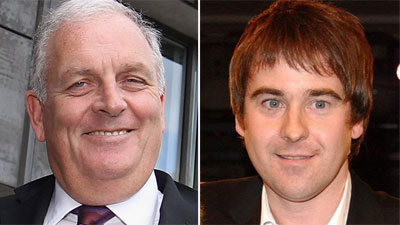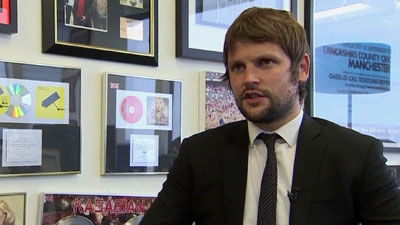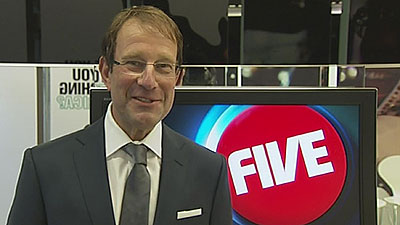|
A former editor of The Sun has told the Leveson Inquiry he did not take
any notice of privacy issues, thought "most things should be published"
and was given 40 minutes of abuse by Rupert Murdoch after libelling
Elton John.
Kelvin Mackenzie edited the top-selling tabloid from 1981 to 1994 and
was responsible for some of its most memorable front pages, including
"Gotcha" after the sinking of the Belgrano during the Falklands war and
" Freddie Starr ate my hamster".
He entertained the media ethics inquiry with an impression of former
prime minister John Major, who called him up after Britain withdrew from
the European Exchange Rate Mechanism.
Speaking in a thin monotone, Mr Mackenzie mimicked Mr Major's phone
call: "I'm just calling you up Kelvin to find out how the story is going
to play in the paper tomorrow."
In his own voice, the former editor then told the inquiry he replied: "I
said actually I've got a bucket of **** on my desk Prime Minister and
I'm going to pour it all over you."
Mr Mackenzie said that his "bullish" attitude to editorship was not
followed by subsequent editors.
"I did 13 years as editor of The Sun. When I left, that attitude
certainly changed," he said when asked by Robert Jay QC, counsel for the
inquiry, whether he had any regard for privacy when he was editor.
Mr Mackenzie replied: "Not really, no."
He told the inquiry that within seven seconds of sending a fax to Mr
Murdoch about paying £1m to settle a libel case with the rock star Elton
John, the proprietor was on the phone giving him "non-stop" abuse for 40
minutes.
 |
|
Mr
MacKenzie and Mr Mohan were quizzed on press ethics |
"It wasn't so much the money," said Mr Mackenzie. "It was the shadow
which it cast over the paper.
"The idea that Rupert Murdoch simply took these things on the chin as
part of the commercial biff and baff of life is wholly ridiculous."
Mr Mackenzie was followed at the inquiry by the current editor of The
Sun, Dominic Mohan, who was tackled about phone hacking after he was
reminded of a joke he had made at an awards ceremony called the SHAFTAS
in 2002.
As part of a speech at the awards, he thanked mobile phone operator
Vodafone's lax security for allowing the Daily Mirror to get so many
showbiz exclusives.
Mr Jay put it to Mr Mohan: "You knew therefore that it was possible to
hack into voicemails fairly readily didn't you?"
Mr Mohan replied: "Yes, I think it was well known."
Mr Mohan was keen to point out that the paper had moved on in the years
since he had worked there, latterly as editor, and said when he took
calls from Mr Murdoch now he was as interested in the success of the
website and the app as he was about the newspaper itself.
"Does he have any influence over editorial content?" he was asked. "No"
Two other former editors of The Sun, David Yelland and Stuart Higgins,
have provided witness statements to the inquiry.
The showbiz editor Gordon Smart told the inquiry he had no knowledge of
phone hacking at The Sun or when he worked briefly at the News Of The
World (NOTW).
He said his job was a balancing act and that it would be very hard to do
it if he was "constantly crossing swords with celebrities".
 |
|
Gordon
Smart said he was not aware of phone hacking |
And royal editor Duncan Larcombe told the panel he was also unaware of
phone hacking taking place.
He said the "culture is, and always has been, to get stories right".
Referring to Mr MacKenzie's earlier comment, Mr Larcombe added that if
he just "lobbed stories into the paper" he would be "lucky to have a job
in Tesco".
Lord Justice Leveson will also hear testimony from the editors of the
Daily Telegraph, Financial Times, the Independent, the Mail on Sunday
and the Daily Express this week as the investigation into the culture
and ethics of journalism continues.
Another key figure in the British media, Richard Desmond, owner of the
Daily Express and Daily Star newspapers, as well as Channel 5, will give
evidence on Thursday alongside current Daily Express editor Hugh Whittow
and former editor Peter Hill.
Mr Hill is expected to be quizzed on claims by a former Express reporter
that he was to blame for a series of false stories about missing
Madeleine McCann.
 |
|
Richard
Desmond, of Express Newspapers, gives evidence this week |
Express Newspapers paid out more than £500,000 to the McCanns in 2008
for libellous coverage in its four titles following the Leicestershire
girl's disappearance.
Lionel Barber, editor of the Financial Times, and Independent editor
Chris Blackhurst have been called to appear on Tuesday, along with
William Lewis, who is now general manager for News International's
titles but was formerly editor-in-chief of The Daily Telegraph.
Current Daily Telegraph editor, Tony Gallagher, will also give evidence
on Tuesday, while the editor of the Mail on Sunday, Peter Wright, will
appear on Wednesday.
Daily Mail editor Paul Dacre is not expected to give evidence until
February.
The Leveson Inquiry was set up by the Government last summer following
revelations that the NOTW commissioned a private detective to hack
murdered schoolgirl Milly Dowler's mobile phone after she went missing
in 2002.
The first part of the inquiry, sitting at the Royal Courts of Justice in
London, is looking at the culture, practices and ethics of the press in
general and is due to produce a report by next September.
The second part, examining the extent of unlawful activities by
journalists, will not begin until detectives have completed their
investigation into alleged phone hacking and corrupt payments to police,
and any prosecutions have been concluded. |




